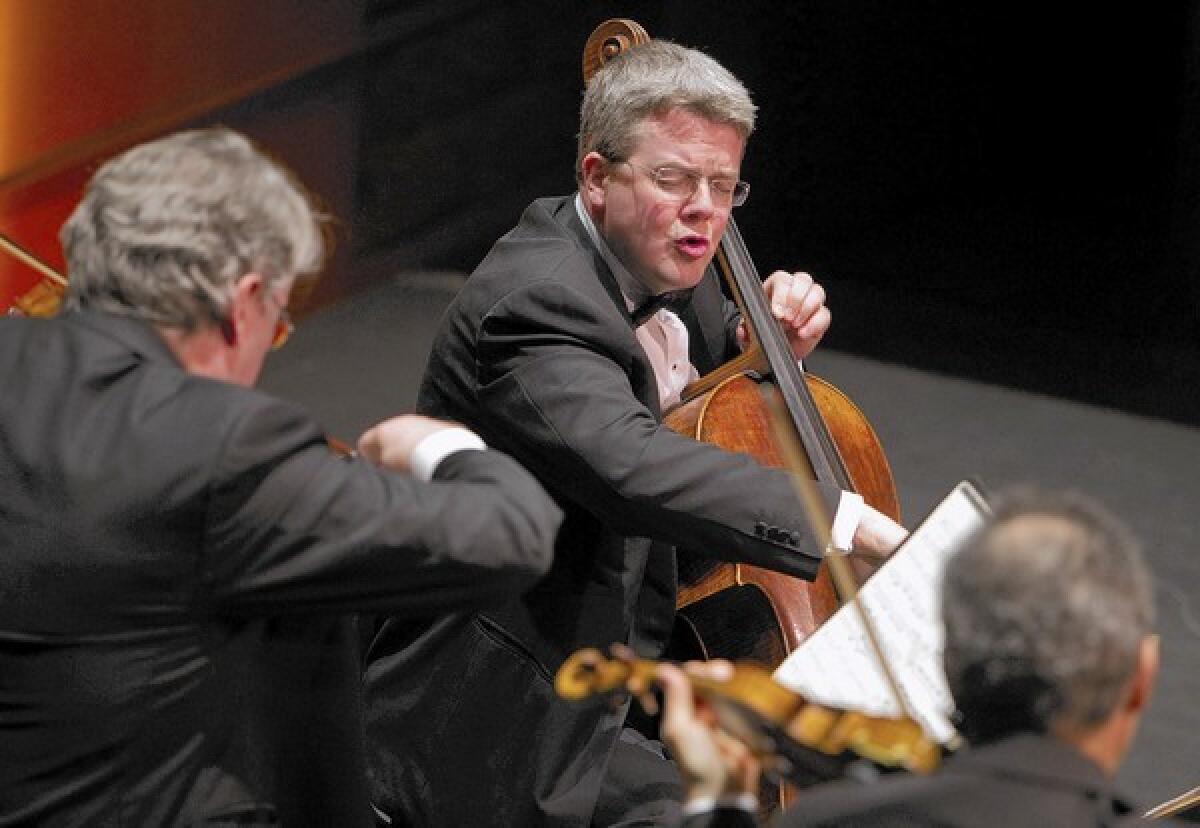Review: Emerson String Quartet shows off new face with Beethoven

âTomorrow they will wear another face,â is how Ralph Waldo Emerson began the closing couplet of his poem âExperience.â
And now, the Emerson String Quartet wears, for the first time in 34 years, another face. Founded in 1976, the year of Americaâs bicentennial, this commandingly all-American string quartet, a national symbol of sorts, welcomes a new nationality. British cellist Paul Watkins recently replaced David Finckel.
âSuccession swift,â the Transcendentalist poet and essayist also wrote in âExperience.â So too was that the case Friday night in the Samueli Theater of the Segerstrom Center for the Arts in Costa Mesa, where the new Emerson String Quartet introduced itself to Southern California with a performance of Beethovenâs three middle-period Opus 59 (âRazumovskyâ) quartet. A robust cello melody, a song of inspiring affirmation, begins the first of these grand, epic string quartets. Watkins played it with a hearty tone and exuberant expression, like an adventurer on a new journey.
CRITICSâ PICKS: What to watch, where to go, what to eat
The ensemble couldnât have found a more suitable cellist for its lush, silky and, when the foursome digs down, full-throttled symphonic sound. There was clearly meaning in choosing these three very big âRazumovskyâ quartets â nearly two hoursâ worth of music â for a single concert. In the last dozen years, the Emerson has been looking at late style (as it did at the Ojai Festival with late Beethoven and with Shostakovich at the Ojai Music Festival in 2002) and bringing important new works our way (as it has with major commissions from Kaija Saariaho and Thomas Adès).
But obviously right now it wants to show it remains in medias res. This is Beethoven showing how he can magnificently overcome lifeâs obstacles and carry on with a triumphant spirit for which there is no equal in all the string quartet literature. He hasnât moved on, yet, to higher realms. The âRazumovskyâ quartets are the glory of the Emersonâs Beethoven recordings of the 1990. Plus, this has always been a macho ensemble with a taste for marathons, such as performing the six BartĂłk string quartets in a single evening.
The other, and inescapable, message Friday was that the Emerson is not a young, or for that matter, middle-aged string quartet. Eugene Drucker and Philip Setzer, who alternate between first and second violins, are founding members, and violist Lawrence Dutton has been on hand nearly from the beginning. Age shows as experience, but as Ralph Waldo further noted in an essay on experience, âSpirit is matter reduced to an extreme thinness.â
Faces to Watch 2014: Classical music | Yotam Haber, Sunny Yang and more
Watkins, a generation younger than the other members, is the thicker player. He is more overtly expressive. He is in his full powers. The others are cooler. The violin sound has thinned over the years and intonation isnât as lock-box secure as it once was. But these are gradual changes. What the ensemble has not lost is its power punches.
More Ralph Waldo: âNature hates peeping.â The Emerson doesnât peep, and when Beethoven comes crashing down, say at the beginning of Opus 59, No. 2, the ensemble still lays a listener low. The ethereal Beethoven to come is hinted at in the âRazumovskyâ quartets, and the Emerson is now better than it once was at hinting without making an unnecessary splash. Thatâs experience.
The quartet once made the slow movements glow through a sheer beauty of sound. Much of that beauty remains, and Watkins contributes a resplendent rich bass pedestal on which beauty can stand in display. But restraint of expression, four men speaking as one voice, is where the profundity was mainly found Friday.
The macho side to the Emerson is still there too, although the quartet doesnât make its virtuosity seem quite so effortless. On the 1994 recording of the Opus 59, No. 3, the quartet took the last movement, a dazzling fugue, at a flabbergasting speed. The showiest groups race through it typically in a little under six minutes.
The timing on the Emersonâs recording is a mind-blowing 5:17. At Samueli, the movement was a different sort of knockout at 5:50.
âUp again, old heart!â Ralph Waldo exhorted, and his namesake string quartet continues in its new guise to demonstrate, for the worldâs true romance is âthe transformation of genius into practical power.â
More to Read
The biggest entertainment stories
Get our big stories about Hollywood, film, television, music, arts, culture and more right in your inbox as soon as they publish.
You may occasionally receive promotional content from the Los Angeles Times.











